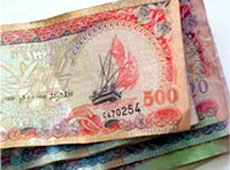President Mohamed Waheed has requested parliament approval to obtain a US$29.4 million loan from the Bank of Ceylon to finance the government’s budget and manage cash flow.
The Ministry of Finance and Treasury is seeking to secure the loan as a way to “enforce” the 2013 budget approved by parliament, stated a letter from the President’s Office read during a parliament session held on Tuesday (August 13).
The Finance Ministry informed the President’s Office that the Bank of Ceylon would provide the Maldives’ government a loan of US$29.4 million, at a six percent interest rate, to be repaid within six years in monthly payments of US$490,000, according to local media.
The Government of Maldives believes the short term loan offers “good terms” and will provide the support necessary to finance the state budget and cash flow. The President’s Office letter also noted that the graduation of the Maldives from least developed country status has made it “extremely difficult” to obtain loans with low interest rates.
Previously, upon parliament’s approval of the 2013 budget, it was agreed that the state could not take out loans with interest rates that exceed seven percent.
The President’s Office Bank of Ceylon loan request has been forwarded to parliament’s finance committee.
Foreign loans for “fiscal problems”
In 2012, President Waheed reportedly said he would not resort to borrowing from foreign governments in order to finance government activities.
“I will not try to run the government by securing huge loans from foreign parties. We are trying to spend from what we earn,” he was reported to have told the people of Nilandhoo Island.
However, the government has sought a number of foreign loans to supplement the state budget.
Last month, the government confirmed it was in discussions with Saudi Arabia, seeking a long-term, low interest credit facility of US$300 million to help overcome “fiscal problems”.
President’s Office Spokesperson Masood Imad confirmed President Waheed had held discussions with senior Saudi Arabian dignitaries including Crown Prince Salman bin Abdulaziz Al Saud over the proposed credit facility, during his recent visit to the country.
“The president has initiated the talks so it is just a matter of working out the details now,” Masood said, explaining that the funds would be used for “budget support” and development projects.
 In September 2012, President Waheed told Reuters that China will grant the Maldives US$500 million (MVR7.7billion) in loans during his state visit to the country.
In September 2012, President Waheed told Reuters that China will grant the Maldives US$500 million (MVR7.7billion) in loans during his state visit to the country.
The loans, equal to nearly one quarter of the Maldives’ GDP, would include $150 million (MVR2.3billion) for housing and infrastructure, with another $350million (MVR5.4billion) from the Export-Import Bank of China, reported Reuters.
China’s aid was hoped to provide an immediate salve to the government’s financial ailments, which at the time included a MVR 9.1 billion ($590million) budget deficit.
Additionally, the government was seeking a US$25 million state loan from India required to support the state budget for the remainder of 2012. The loan was delayed after the Maldives’ government failed to submit the requested paperwork, a diplomatic source from the Indian High Commission in the Maldives previously revealed.
The US$25 million loan was agreed as part of the $US100 million standby credit facility signed with Prime Minister Manmohan Singh in November 2011.
It is not clear whether the foreign loans from India and China have been received, or whether parliament has approved the state obtaining loans from Saudi Arabia or Sri Lanka’s Bank of Ceylon.
Finance Minister Abdulla Jihad as well as Deputy Speaker, Parliamentary Financial Committee Head, and People’s Alliance (PA) MP Ahmed Nazim were not responding to calls at time of press.
Failure to fill budgetary gaps
Finance Minister Abdulla Jihad claimed back in late December 2012 that the MVR 15.3 billion (US$992 million) state budget approved by parliament might not last until the end of 2013 – requiring supplementary finance for the state.
In April 2013, Jihad sought authorisation from parliament to divert MVR 650 million (US$42 million) allocated for infrastructure projects in the budget to cover recurrent expenditures.
Jihad warned that government offices and independent institutions might be unable to pay salaries or electricity and phone bills if funds were not transferred from the MVR 1.8 billion (US$117 million) Public Sector Investment Programme (PSIP).
electricity and phone bills if funds were not transferred from the MVR 1.8 billion (US$117 million) Public Sector Investment Programme (PSIP).
Earlier in April, Jihad also announced that the government had decided to delay all new development projects that were to be financed out of the state budget due to shortfalls in revenue.
The decision to suspend new projects was revealed after Housing Minister Dr Mohamed Muiz told local media at the time that he had been instructed not to commence any further infrastructure projects included in the 2013 budget, such as harbour construction or land reclamation.
“Reckless financial management”: MDP
In July, Maldivian Democratic Party (MDP) MP and Spokesperson Hamid Abdul Ghafoor said that the heavily partisan parliament now effectively controlled state finances as a result of former opposition politicians – now part of President Waheed’s government – imposing tighter spending restrictions on former President Mohamed Nasheed’s administration.
Ghafoor argued that with the MDP failing to recognise the legitimacy of the present government due to the controversial transfer of power last February, he did not believe there would be support for approving the credit agreement with Saudi Arabia due to the government’s existing extravagant borrowing levels.
The party accused the current government of reckless financial management, pointing to a potential US$1.4 billion compensation bill facing the state for deciding last year to abruptly terminate a US$511 million airport development contract agreed with infrastructure group GMR.
The compensation claim amounts to four times that of the Maldives’ current state reserves should it be awarded by a Singapore court overhearing arbitration hearings between GMR and the government.
“Since we do not see this government as legitimate, we do not see why we should support them,” he said. “They have put us into debt with their handling of the airport development and another bill for a border control system.”
Earlier in July, Malaysian security firm Nexbis invoiced the Department of Immigration and Emigration for US$2.8 million (MVR 43 million) for the installation and operation of its border control system technology in the country, in line with a concession agreement signed in 2010.
Likes (3)Dislikes
(3)Dislikes (1)
(1)  In September 2012, President Waheed told
In September 2012, President Waheed told  electricity and phone bills if funds were not transferred from the MVR 1.8 billion (US$117 million) Public Sector Investment Programme (PSIP).
electricity and phone bills if funds were not transferred from the MVR 1.8 billion (US$117 million) Public Sector Investment Programme (PSIP).